Arcanum Updated Preview
We revisit the world of Arcanum with an updated preview of this upcoming role-playing game.
We've recently been given a chance to delve deep into the world of Arcanum, the Victorian fantasy RPG in development at Troika Games. As is commonly known, the team at Troika consists primarily of Interplay alumni, whose past credits include Dungeon Keeper, Fallout, and Fallout 2. Naturally, we had high expectations as we approached this beta build of the game. Fortunately, what we've seen has, for the most part, impressed us--the game seems huge, deep, and open-ended. The world of Arcanum presents you with a humbling array of options from its very outset, and the theme seems inspiringly consistent throughout. Those anticipating an experience similar to Fallout will find their hopes to be spot on--the team at Troika has lived up to its legacy quite well and seems to have delivered an experience as intricate and engrossing as that of the Black Isle classic, in a world just as lovingly crafted and believably populated.
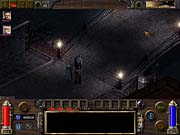
Arcanum--as the game's world is called--is a fantasy realm like no other. Set in a world just on the heels of its industrial revolution, the game takes all the trappings of high fantasy and sets them alongside steam engines, assembly lines, and industrial economics. In the world of Arcanum, magic-wielding high elves coexist with gnomish bankers, orc wage slaves, and dwarven mechanics. The dichotomy between magic and technology is very real; magic users cringe at the sight of a steam-driven locomotive, while electric lights flutter and fail in the presence of magic. All of this has a tangible effect on the game's systems--if your characters specialize in spellcasting, scientific constructs, such as guns and medicines, will often prove useless to them. Conversely, if your characters are staunch technologists, magic spells will flicker in their presence, robbing them of the ability to be magically healed, hasted, or otherwise enhanced. Luckily, the game's character-generation system is very versatile and open-ended, and it lets you walk the delicate line between magic and technology--if you're so inclined.

As you'd expect, the system bears more than a superficial resemblance to Fallout's S.P.E.C.I.A.L system. The classless system lets you allocate character points to attributes and skills of your choosing, granting you the ability to specialize in both broad and specific areas. You can learn both magical spells and technological disciplines, on top of a host of useful weapon proficiencies and skills. You can also set your characters' backgrounds--Arcanum's version of Fallout's traits--which grants them bonuses but also imposes penalties. Simply put, the number of options presented is staggering--80 spells are divided into 16 magical colleges and 56 technological schematics (technological equivalents to spells), which are divided into eight disciplines, and that's not counting the skills. From the game's very outset, you're made to learn that specialization is key.
All the characters you'll encounter, however, have their own sets of skills and affinities, so you'll definitely have access to skills you may have missed out on if you enlist the proper characters into your party. And with a world as rich as Arcanum, you'll definitely be motivated to do a good deal of exploring for such a purpose. For more information on the game's character-creation system, check out our previous coverage.
Tarant and its Inhabitants
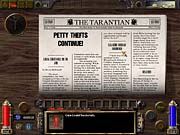
Tarant is Arcanum's civilized center--an industrial metropolis, boasting a rich, diverse population, a thriving industrial sector, and, of course, a teeming, seedy underbelly. Early on in the game, your travels take you to this altogether fascinating place, and you'll easily find a great deal to do there. It's in Tarant that you'll be introduced to the world's unique social dynamics as you interact with the city's population throughout the course of your quest. A host of opportunities for adventure await therein, as well as many a chance for casual interaction with some truly interesting characters.
The city is fairly huge, and all its streets--from the grandest avenue to the most insignificant turn--are amusingly named. Its inhabitants will often refer to particular addresses when asked for information, which will cause you to memorize major streets and intersections fairly early on. Furthermore, all of Tarant's major districts are connected by means of an underground rail system, with stops in most major areas. At this point, unfortunately, transit is fairly no-frills--you merely click on a station and emerge several seconds later at your destination.
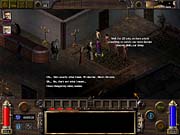
Tarant is a full-featured city. You'll find various shops catering to characters of all affinities, as well as many fonts for gossip and information. You'll find your standard assortment of weapon and armor shops in town, where you can purchase plate-mail armor, enchanted long swords, and arrows to fill your exhausted quiver. There's also a mages' guild, where you can find magical scrolls and other sorts of enchanted items. Those technologically inclined will have access to a gadgetry shop that sells the components essential to their craft--sheets of scrap metal, chambers for guns, and all types of salves and solvents for use in the crafting of therapeutic tonics. There's even a fashion boutique and a brothel in town, which cover desires both trifling and illicit. The commercial buzz in the city really does much to imbue it with life, and you can easily get lost in its many shops and watering holes.
A host of other distractions are also available within the city's walls. One of the more interesting ones is a genuine house of curiosities (read: freak show) run by a P.T. Barnum-esque figure, featuring, among other things, a politically savvy orc, a steam engine made of toothpicks, and--in an obvious tribute to Fallout--a two-headed cow. Scattered throughout town are a host of other diversions that you'll surely find occasion to indulge in, including several mediums (both genuine and false), a collection of taverns and flophouses, and a particularly thriving gentlemen's club, home to both the city's social elite and a number of opportunities for adventure. In truth, it seems as if opportunities for adventure are only as far as the next building in Tarant, and you'll find that it's quite easy to lose track of your primary objectives if you let yourself. Luckily, all the best RPGs are designed with this sort of thing in mind, and from what we've seen, the game's system doesn't penalize you at all for your haphazard meanderings.
Tarant: Early Meanderings
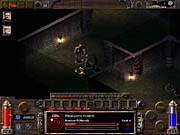
Although your primary objective in Tarant is to find the manufacturer of a mysterious ring whose guardian you've seemingly become, you'll find that there are a great number of people conspiring against the timely procurement of the information you seek. In brief, the game starts off with a rather dramatic zeppelin crash--a tragedy of which your character is the sole survivor. You find yourself conveniently located next to a dying gnome, and after the smoke settles, he subjects you to a rather lengthy dialogue and entreats you to deliver the aforementioned ring to its rightful owner. After stressing the utmost import of your assignment, he quietly dies. Soon after, you're rescued by a gentleman who clues you in to a key fact--that you are, indeed, the reincarnation of an ancient elfin hero who's supposed to fulfill some divine prophesy. Your subsequent travels take you to the small village of Shrouded Hills, and, ultimately, to Tarant proper in search of a wise elder who will supposedly shed light on this altogether twisted affair.
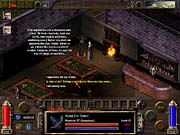
As you'd surely expect from any competent RPG, Arcanum boasts side quests in great abundance. Throughout the course of and even after your search for P. Schuyler and Sons--the firm whose engraving appears on the mysterious ring--a host of diversions will fall on your path, and, as any canny RPG player has learned, following them is a good way to develop your character and explore the gameworld. The quests we chose to explore during our run through Tarant ranged from fairly standard (clearing the rats out of an abandoned warehouse) to amusingly outlandish (retrieving a prostitute's lost bauble from the home of a married john). Some quests require you to be a good samaritan, while others call for you to be downright dastardly. To attract or deter you from such acts, the game features a fairly involved alignment system, which calculates all your actions and presents you with a numerical value representing your good (or evil) nature. Occasionally, you'll be rewarded or penalized for your actions in the form of blessings and curses, depending on your overall behavior toward the game's inhabitants. In any case, curses can be magically lifted, and further in-game events can erase both positive and negative karmic effects. For example, if your character is prone to sudden changes of heart, the game will quickly recognize this and duly compensate.
Since many of Arcanum's designers worked on the Fallout series, lengthy dialogue sequences with a variety of characters are to be expected. Though the game can be completed by simply focusing on physical combat, many of the more interesting side quests will be available only to those charismatic enough to access the proper dialogue options. This is what's arguably most engrossing about open-ended RPGs--the ability to immerse yourself in the game's world by communicating with its inhabitants in a convincing manner. It's these types of options that make pumping up a character's charisma and beauty scores practical; whereas beefed-up powerhouses will be able to take out demons in droves, it's the canny interlocutor that'll be able to extract the key bit of information necessary to complete a quest. Many of the early missions we got to sample let us flex our social muscles, and the dialogue we witnessed was quite well written and, in regard to the period in which it was set, very convincing.
Where Magic Meets Gunpowder
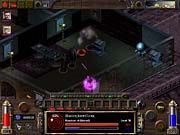
Many of the game's early quests also put us in direct contact with potential hazards, however. One quest in particular led our party into the sewers of Tarant in search of a city dweller's lost wedding ring. The sewers were densely populated with giant rats and worse, which let us test out both our firearms and magic spells. Combat in Arcanum is fairly versatile in terms of mechanics: You can go about battles in either a turn-based or real-time fashion. For those wanting a comfortable medium, there's a "fast turn-based" setting that plays out a monster's and nonplayer character's (NPC's) actions rapidly, speeding up the process of combat.
People who have played computer RPGs in recent years will feel right at home when fighting in Arcanum. The real-time mode is very similar to those found in Baldur's Gate and Fallout Tactics; in effect, everything is calculated on the fly--attack roles, initiative, and all other modifiers. In these types of games, the "real-time" effect is mostly aesthetic--all things happen in the order that they're supposed to, and only individual rounds melt into each other, creating the illusion of boundless action. Our experience with the game's real-time mode has left us with mixed feelings. While it does make the action that much more intense, the nature of the game's interface makes it a tad difficult to manage battles in real time. As a result, a good deal of pausing during most battles is required to make it through them alive. For this reason, turn-based battles definitely seem like the way to go. Since you'll be managing the actions of only one character (your NPCs are autonomous, as they are in Fallout), there's really no reason to not play it turn based, especially if your character is a heavy spellcaster who has to constantly dig through spell menus.
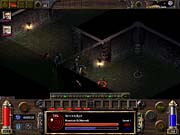
Magic users will find that strict management of their fatigue ratings is essential to survival. Your fatigue level is what dictates exactly how many spells you can cast before collapsing--go over that amount, and you'll find yourself prone, at the mercy of your enemies. As logic would dictate, more-powerful spells exhaust you more quickly than more-modest ones, and this adds a different kind of strategy to the proceedings--when an inexhaustible supply of mana regulates spells, it's easier to mindlessly let fireballs loose than not. While higher-level characters will obviously have less trouble letting powerful spells loose, the possibility of physical collapse will always remain a very real threat, however distant.
Fortunately, your companions seem smart enough to be able to help you if things get ugly. As mentioned before, they'll act totally independent of you during battles, casting spells, firing guns, and swinging their swords. They also seem to be very receptive to your own needs during battles--if you're injured, they'll cast healing spells on you, and if you're mobbed by creatures, they'll rush to your aid. While not being able to control every member of your party may seem a bit off-putting at first, you'll quickly come to appreciate the game's effect--all the characters seem to be autonomous players in the larger scene, acting in accordance with their own motivations, even in battle. While they won't always do exactly what you want them to, this seems to work well toward the purpose of keeping you immersed in the game.
Final Thoughts
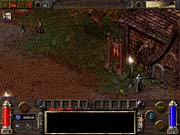
All in all, Arcanum seems to be shaping up in much the manner that we expected it to. The game seems remarkably large and deep--plus, delving into such a huge, well-crafted world is often as intimidating as it is delightful. There's no denying, however, that the game is technically quite modest--despite its grandeur, the world is rendered via a simple 2D engine and lacks the fancy effects that will become commonplace in the coming wave of RPGs. The limitations of this are evident--many characters seem lifeless and underdetailed, in a definite throwback to the more "iconic" days of the RPG genre. But just as the game's potential limitations are readily apparent, so are its definite strengths: an absolutely thrilling character-generation system and a hearty amount of open-ended gameplay. There are a number of ways to play through the game, and there's no doubt that eager players will be willing to go through it their own way. Given the amazing number of options presented to you in terms of character generation, a huge variety of experiences are readily apparent. Playing as a gun-toting dwarven smith, for instance, will surely yield an experience altogether different from playing as an elfin magician. The great part, though, is that neither of these two vastly disparate options is represented in the game by shallow, canned gameplay mechanics. On the contrary--both paths will seemingly let the game play out in a unique fashion. Plus, the skills and characteristics of both character types are highly different. This is a testament to both the versatility of the game's system and the ingenuity of the game and narrative design.
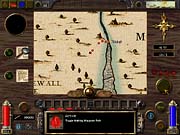
At this point in the process, the game still bears a handful of bugs, which is due to its beta status. While none of them seriously compromised the experience of the game, their occurrences, however uncommon, did detract from the overall flow. We've no doubt, however, that most bugs will be squashed well before the game goes gold. At this point, also, the game runs pretty slowly overall--some optimization will help out its cause a great deal. Much of this is surely due to the game's 2D-intensive nature; the load times for all the areas are remarkably long at this point, and waiting for things to happen does prove a bit tedious. Troika does have sufficient time to iron out all these matters, though, and the final product will hopefully reflect this.
Needless to say, we're very excited about Arcanum's prospects. What we've been shown clearly reflects a top-notch RPG, with game systems well conceived and a world and narrative both memorable and intriguing. The depth of the game and its world are readily apparent, and even this ultimately flawed version bears the makings of a great game. The team at Troika definitely knows how to put together a game of this type, and fans of its previous work will do very well to check this game out when it hits shelves in the middle of next month. For more information on the game's intricate systems, check out our previous in-depth preview coverage.
Got a news tip or want to contact us directly? Email news@gamespot.com
Join the conversation